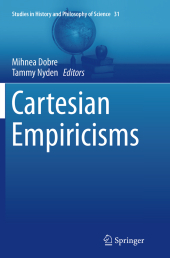 Neuerscheinungen 2016Stand: 2020-02-01 |
Schnellsuche
ISBN/Stichwort/Autor
|
Herderstraße 10
10625 Berlin
Tel.: 030 315 714 16
Fax 030 315 714 14
info@buchspektrum.de |

Mihnea Dobre, Tammy Nyden
(Beteiligte)
Cartesian Empiricisms
Herausgegeben von Dobre, Mihnea; Nyden, Tammy
Softcover reprint of the original 1st ed. 2013. 2016. xiii, 326 S. 7 SW-Abb., 2 Tabellen. 235 mm
Verlag/Jahr: SPRINGER NETHERLANDS; SPRINGER 2016
ISBN: 9402405801 (9402405801)
Neue ISBN: 978-9402405804 (9789402405804)
Preis und Lieferzeit: Bitte klicken
This expansive guide to more than two dozen European Cartesians who placed empiricism at the heart of their praxis in the seventeenth century shows that Descartes´ followers were active promoters of the experimental method in all the natural sciences.
Cartesian Empiricisms considers the role Cartesians played in the acceptance of experiment in natural philosophy during the seventeenth century. It aims to correct a partial image of Cartesian philosophers as paradigmatic system builders who failed to meet challenges posed by the new science´s innovative methods. Studies in this volume argue that far from being strangers to experiment, many Cartesians used and integrated it into their natural philosophies. Chapter 1 reviews the historiographies of early modern philosophy, science, and Cartesianism and their recent critiques. The first part of the volume explores various Cartesian contexts of experiment: the impact of French condemnations of Cartesian philosophy in the second half of the seventeenth century; the relation between Cartesian natural philosophy and the Parisian academies of the 1660s; the complex interplay between Cartesianism and Newtonianism in the Dutch Republic; the Cartesian influence on medical teaching at the University of Duisburg; and the challenges chemistry posed to the Cartesian theory of matter. The second part of the volume examines the work of particular Cartesians, such as Henricus Regius, Robert Desgabets, Jacques Rohault, Burchard de Volder, Antoine Le Grand, and Balthasar Bekker. Together these studies counter scientific revolution narratives that take rationalism and empiricism to be two mutually exclusive epistemological and methodological paradigms. The volume is thus a helpful instrument for anyone interested both in the histories of early modern philosophy and science, as well as for scholars interested in new evaluations of the historiographical tools that framed our traditional narratives.
Acknowledgments.- Abbreviations List.- List Of Contributors.- Table of Contents.- 1. Introduction; Mihnea Dobre and Tammy Nyden.- Part I: Cartesian Natural Philosophy: Receptions and Context.- 2. Censorship, Condemnations, and the Spread of Cartesianism; Roger Ariew.- 3. Was there a Cartesian Experimentalism in 1660´s France?; Sophie Roux.- 4. Dutch Cartesian Empiricism and the Advent of Newtonianism; Wiep van Bunge.- 5. Heat, Action, Perception: Models of Living Beings in German Medical Cartesianism; Justin Smith.- 6. Could a Practicing Chemical Philosopher be a Cartesian?; Bernard Joly.- Part II: Cartesian Natural Philosophers.- 7. Empiricism Without Metaphysics: Regius´ Cartesian Natural Philosophy; Delphine Bellis.- 8. Robert Desgabets on the Physics and Metaphysics of Blood Transfusion; Patricia Easton.- 9. Rohault´s Cartesian Physics; Mihnea Dobre.- 10. De Volder´s Cartesian Physics and Experimental Pedagogy; Tammy Nyden.- 11. The Cartesian Psychology of Antoine Le Grande; Gary Hatfield.- 12. Mechanical Philosophy in an Enchanted World: Cartesian Empiricism in Balthasar Bekker´s Radical Reformation; Koen Vermeir.- Bio-Bibliographical Appendix for Cartesians Discussed in Part II.- Index.


